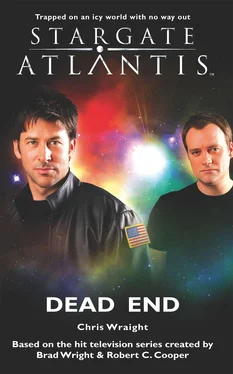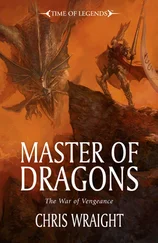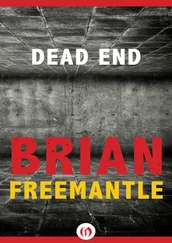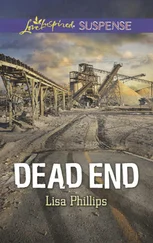Teyla ran her fingers carefully across its smooth cold surface. “We can go no further,” she said. “That is something, at least.”
Miruva stood alongside her, and pressed her face close up against the flawless stone. “I can’t see a thing,” she said. “This is just a blank wall.”
Teyla turned to her left and began to walk beside the sheer face, keeping her fingers lightly grazing the surface. “This wall continues for some distance,” she said. “I think this may be what we are looking for. Let us follow it for a while.”
The silence became ever more oppressive, the darkness ever more threatening. To their left, the dimly-lit columns passed in gloomy files, like an army of frozen giants.
Teyla began to lose heart. The hall was gigantic. If they tried to map out the entire area in the dark it would take them days. For all she knew, they had already passed several exits. It was almost impossible to make anything out.
She began to become despondent. “I think…” A sudden impact on her forehead sent her reeling backwards. She staggered.
“Are you alright?” cried Miruva, groping forward to find her in the dark.
“I am fine,” said Teyla. Her forehead smarted, but it was nothing serious. She had walked into a wall, jutting out at right angles from the one she had been following. Easy enough to do in the circumstance, but still embarrassing.
Teyla peered at the obstacle. It was a buttress of some kind, set hard against the wall to her right. It was about five feet across and, for all she could tell, stretched up as far as the hidden ceiling far above them. She ran her fingers over it, testing for any indentation or marking. It was as smooth and featureless as everywhere else.
Just as she was about to give up, light blazed from its surface. The illumination was not severe, but after so long in the dark it brought tears to Teyla’s eyes. She stepped back, shielding her face. The light dimmed and resolved into a shape. A symbol had sprung into life on the obsidian buttress, scored in lines of silver.
“By the Ancestors,” breathed Miruva, looking at the emerging shape in wonder. “We’ve found it.”
A dozen questions ran through Sheppard’s mind at once. This was good. Very good. Probably.
“What d’you know about this place, Helmar?” he asked, seized by a sudden idea. “Anything special about it?”
Helmar shook his head. “We’re out on the high plains,” he said. “Nothing special that I know of.”
Sheppard studied the proximity meter again. “You people live in caves, right?” he said, thinking out-loud. “Makes some sense — it’s real cold. But maybe even when it wasn’t you guys still did it.” He started to talk more quickly, warming to the theme. “Maybe there are places down there you’ve forgotten even existed. Maybe…”
He looked down again, as if by concentrating hard enough he could penetrate the layers of ice and rock to see what lay beneath. If he was right, the signals were coming from a long way down. And if Ancient technology was having trouble penetrating that far, then that meant dense rock.
“You really don’t know anything about this place?” he asked. “No scary stories of goblins living under the rock?”
Helmar shifted, uneasy. “I don’t know much,” he said. “No one pays much attention to stories. Aralen might be able to tell you.”
Sheppard frowned; he couldn’t imagine the Foremost liking what he had in mind. “Yeah, maybe he would,” he said. “But one way or another, we’re gonna have to get down there. You know how to mine, right?”
Helmar nodded enthusiastically. “Of course. Even our children know how to use a mallet and ice-axe.”
“Just what I wanted to hear,” said Sheppard, putting the life signs detector away. “I like the way this conversation is going.”
He glanced at the horizon. The clouds were still some distance off, but they looked like they were building. The window of opportunity was closing.
Helmar squinted at the clouds. “What are we going to do?”
“Get back to the settlement,” Sheppard said. “We’re gonna need every spare pair of hands you’ve got, and fast.”
McKay placed his pliers down wearily and admired his handiwork. But as soon as he saw the pile of wiring in front if him, his heart sank. It looked ready to fall apart at any moment. Using crude tools on millennia-old Ancient technology was like trying to fix a computer with a flinthead axe. Not impossible, but you’d only want to try it if there was absolutely no alternative.
The module was almost complete. Zelenka’s instructions had been frustratingly elliptical in places and the man had clearly not quite realized what conditions McKay would have to work in. It was one thing constructing a complex piece of equipment back on Atlantis, where there were whole banks of computers dedicated to running simulations and pinpointing structural weaknesses. Working in the rear bay of a semi-functional Jumper in the middle of a snowfield was somewhat different.
Still, it could have been worse. The life support was now more or less fully functional, making the environment in the Jumper pretty much as comfortable as it ever was. Fixing delicate control nodes to fragile input actuators was much easier when your fingers didn’t feel like frozen sausages. Much of the power to the drive system was restored and it wouldn’t be long before the Jumper could take off again.
As for the module itself, that was a complete mystery. It was impossible to test before the Jumper actually attempted to break the event horizon. He looked across the jury-rigged equipment once again; its shoddy appearance didn’t fully reassure him. However, as long as you were prepared to ignore the aesthetics, McKay couldn’t see an obvious reason why it wouldn’t work. It would just take some careful handling, a bit of faith, and a fair slice of luck.
McKay collected his essential equipment together, and shut down the experimental parts of the system. He powered up the long range scanners one last time, hoping against hope to see something different on them. It was just the same. No sign of Teyla or Ronon, just a wall of storm-cloud closing in on them from every direction. He adjusted the range, taking it out to its maximum setting. Mile upon mile of turbulence. It looked terrifying. He flicked off the viewscreen, pulled on his layers of furs again, and stood up stiffly. Hours of work had fused his joints together and he winced as he moved.
“Rodney? You there?” Sheppard’s voice crackled over the radio.
McKay picked it up. “Just about. I hope you’re enjoying yourself while I slave away here.”
“Know what? I am. But we’re heading back now.”
“Any sign of Teyla or Ronon?”
“Maybe. I’ll explain when I get back. How’re you getting on?”
McKay didn’t look at the pile of electronics again. He really had no faith in it at all. “Excellent,” he said. “Well ahead of schedule.”
“Good. We’ll see you back at the settlement. Sheppard out.”
McKay sighed. No ‘thanks Rodney’, or ‘that’s amazing Rodney — well done’. As ever, John seemed almost oblivious to how much work he’d had to do just to give them a fighting chance of getting home.
He flicked a switch and the rear door lowered. Immediately the biting air rushed in. McKay hurried outside and quickly sealed the Jumper. Turning his back on it, he began the trudge back to the Forgotten settlement.
Ronon kept his eyes fixed on the light streaming through the doorway at the far end of the tunnel. It was low and almost perfectly round. Before Ronon could stop him, Orand ducked under the lintel and disappeared. Cursing beneath his breath, Ronon had no choice but to follow. He had to bend double to get under the lip of the rock, but after that he managed to squirm through easily enough. On the far side, surrounded by blue, he gasped with amazement.
Читать дальше












